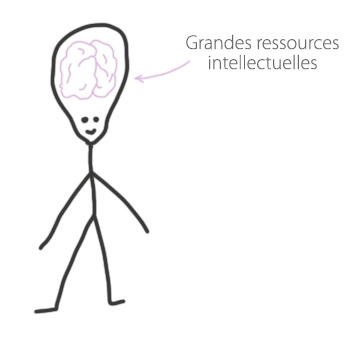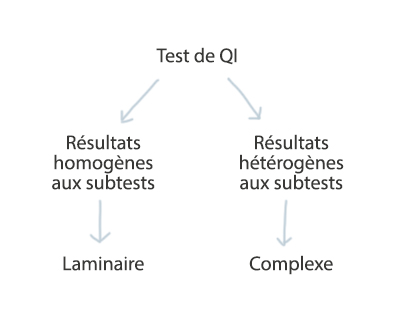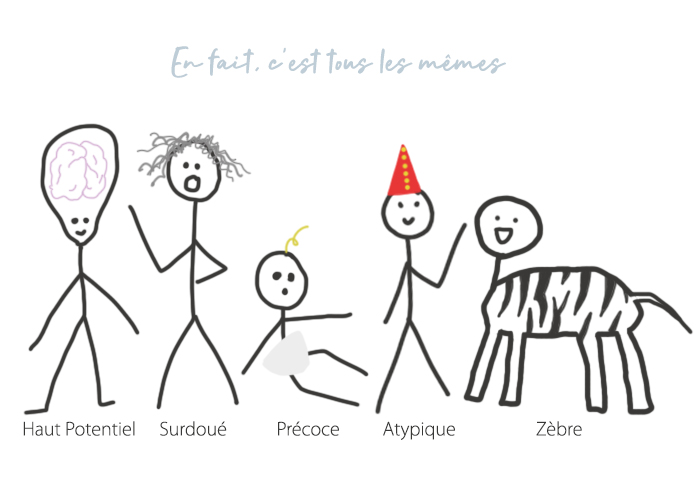Si vous avez déjà fait quelques recherches sur le sujet, vous êtes forcément déjà tombé(e) sur un de ces termes : haut potentiel, zèbre, surdoué, précoce, et j’en passe ! La première fois que ma psychologue m’a expliqué ce que c’était, elle ne me parlait que de haut potentiel intellectuel. Ce n’est qu’en faisant mes recherches de mon côté que j’ai rencontré ces autres mots. Mais du coup, c’est quoi la différence ? Qu’est-ce que ça change ? Pourquoi toutes ces expressions ?
Dans cet article, je vais essayer de répondre à ces interrogations.
L’adulte à haut potentiel
L’adulte à haut potentiel (ou adulte HP, adulte zèbre) est un adulte qui a des capacités élevées. Vous pourrez trouver ce haut potentiel décliné sous deux formes : le haut potentiel intellectuel (HPI) et le haut potentiel émotionnel (HPE). Malgré tout, le potentiel renvoie à l’idée de ressources. Il s’agit donc là d’une personne qui aurait plus de ressources. Je ne sais pas vous, mais moi je ne me sens pas spécialement plus intelligent (intellectuellement comme émotionnellement) que les autres.
Parler de haut potentiel me semble limite prétentieux. Encore une fois, on ne joue pas à qui a la plus grosse. Et puis, puisque j’ai ce haut potentiel, est-ce que je suis obligé de faire quelque chose de « grand » dans ma vie ? Est-ce que je suis obligé d’utiliser mes « grandes ressources » intellectuelles et émotionnelles, sans quoi elles seraient gâchées ?
Non, ce terme de haut potentiel ne me convient pas totalement.

Le surdoué
Le surdoué désigne également une personne qui a des grandes capacités cognitives. En fait, le surdoué et le haut potentiel sont… la même personne. Seulement, comme les recherches sur le sujet ne sont pas complètes, chacun y va avec son propre mot pour tenter de le définir.
Surdoué veut donc dire « plus doué », sous-entendu plus doué que les autres. On retombe un peu sur notre histoire de grandes ressources. Si je suis plus doué que mes camarades, est-ce que je suis obligé d’utiliser cette douance (le fait d’être doué) pour ne pas la gâcher ? Dans tous les cas, je ne me sens pas plus doué que les autres. Différent, oui, mais pas plus doué.
Cette expression d’adulte surdoué ou de personne surdouée ne me convient donc toujours pas.

Le précoce
Le fait d’être précoce se rapporte souvent à un enfant (sauf dans le cadre de certaines activités « sportives », mais ce n’est pas le sujet de ce site). On parle d’enfant précoce, voire même d’enfant intellectuellement précoce (EIP).
Lorsqu’il s’applique chez des jeunes, j’arrive à le comprendre. En effet, l’enfant précoce va souvent découvrir les choses avant ses camarades. Il est donc précoce, ou en avance. Mais une fois que l’âge adulte arrive, cette avance se perd car les autres rattrapent leur retard. Et à ce moment-là, peut-on parler d’adulte précoce ? Je ne pense pas, ça me semble étrange…
De plus, même chez l’enfant il est délicat de parler de précocité. Dans mon cas, je n’ai jamais rien découvert avant les autres. Je n’étais pas le petit génie en classe qui sait tout avant que les professeurs ne l’expliquent. On peut éventuellement dire que j’étais très mature pour mon âge et en avance sur certaines réflexions, mais je n’avais aucune précocité scolaire.

Le profil atypique
Un profil atypique, ou une personne atypique, est moins fréquemment employé dans la littérature. Néanmoins, il reste parfois présent. On fait référence ici à une personne qui n’est pas typique, qui n’est pas « dans la norme » et qui donc n’est pas normale. Or, je nous considère comme des personnes tout à fait normales. Des personnes différentes, mais normales. Au fond, c’est quoi la normalité ?
Et puis le terme « atypique » peut s’utiliser sur de nombreuses autres choses. Un enfant qui choisit de s’intéresser au tir à l’arbalète et aux matelas aura, vous en conviendrez, des centres d’intérêts atypiques et donc un profil atypique. Pour autant, on ne peut pas conclure que son fonctionnement cognitif soit différent.
Je me permets également d’ajouter que l’expression neuro-typique existe, et se réfère aux personnes qui ne sont pas des hauts potentiels (ou surdouées, ou autres).

La personne zèbre
La personne zèbre (ou personnalité zèbre) est un haut potentiel, un surdoué, un (ex) enfant précoce, etc. Il s’agit de la même personne qui a un fonctionnement cognitif (donc un fonctionnement de son cerveau) différent.
Le terme zèbre a été utilisé pour la première fois par la psychologue Jeanne-Siaud Facchin. Elle l’explique par le fait que le zèbre est le seul* équidé que l’Homme n’a pas réussi à domestiquer. Dans la savane, on le remarque facilement avec ses rayures. Mais, paradoxalement, ce sont ces mêmes rayures qui lui permettent de passer inaperçu et de se fondre dans la masse. Le zèbre est différent tout en étant pareil. Donc être un zèbre, ou avoir une personnalité zèbre, c’est se sentir différent tout en se fondant dans la masse. C’est avoir une façon de penser et de réagir différente.
Je ne sais pas pour vous, mais moi ça me parle. Il n’y a plus cette notion de fausse supériorité que l’on avait avec le haut potentiel ou le surdoué, ni d’avance avec le précoce. Ici, on se concentre vraiment sur la différence qui, paradoxalement, nous permet aussi de nous rendre invisible.
* avec le cheval de Przewalski

Les laminaires et complexes
Les personnes laminaires et complexes sont deux sous-ensembles des personnes zèbres. En fait, la différence se découvre (ou plutôt se vérifie, parce que l’on peut avoir certains indices en amont) lors des résultats du test de QI. Un test de quotient intellectuel se compose de plusieurs petits tests (appelés subtests). Votre résultat global est donc composé, en réalité, de plusieurs scores obtenus à ces subtests. Si ces différents scores sont globalement homogènes (ou des résultats homogènes), alors on parle de personne / cerveau laminaire. Dans le cas contraire, avec des résultats hétérogènes, on parle de personne / cerveau complexe.
Même si les termes existent, je trouve que, lorsque l’on débute sur le sujet, il n’est pas spécialement nécessaires de les connaître. D’après mon expérience, la frontière entre les personnes laminaires et complexes est plutôt perméable.

Conclusion : haut potentiel, zèbre, surdoué, etc. : pas de différence !
Vous l’aurez compris, toutes ces expressions désignent la même personne. C’est d’ailleurs pour ça que des fois vous pourrez trouver des « mix » entre elles : un zèbre surdoué, un surdoué atypique, un zèbre laminaire, etc. C’est également pour la même raison (et pour éviter des répétitions trop lourdes) que, au cours de votre lecture sur ce site, je vais alterner entre ces différentes expressions. Même si, on l’a vu, je ne suis pas nécessairement fan de certaines, elles ont le mérite d’exister et, j’en suis convaincu, parleront mieux à certains d’entre vous qu’à moi.

